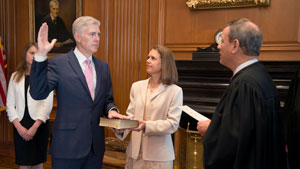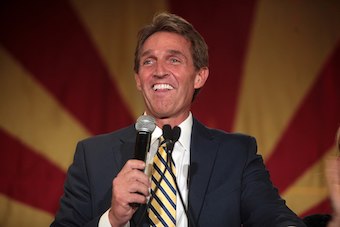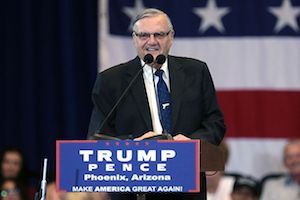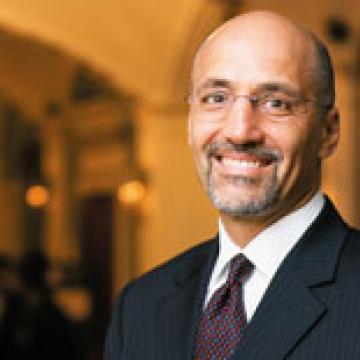From the director: Conservatism after Charlottesville
The president’s battles with his own party could not come at a worse time
Labor Day weekend usually marks the beginning of the fall legislative campaign. In the first year of a presidency, it is the start of the homestretch—where a new president pushes to accomplish his major legislative victory. After that, as Lyndon Johnson famously noted, Congress stops thinking about the president and starts worrying about midterm elections in the second year.
Presidents Obama, Bush 43, Clinton, and Carter all focused on their first autumn to score a major legislative success. Each started with his party controlling both houses of Congress in the first year. And each wrestled with his own party’s leadership to move his agenda forward.
Managing congressional majorities, with “big-tent” coalitions, is harder than the math of a majority suggests. And it’s even harder when the president has run against the establishment.
Yet it is also hard to find a moment in American history when a president and his party are on the verge of total collapse so early in an administration.
As 2017 enters its homestretch, it is unclear who needs whom more—the anti-establishment president or traditional conservatives.
As P.J. O’Rourke put it, the president’s 2016 victory was more a rebellion than an election—not as much about red versus blue as about elites versus everyone else. During the primaries, the establishment “denounced the candidate as a fascist who disgraced conservative principles,” according to the Hoover Institution’s Peter Berkowitz. In response, the president and his supporters “dismissed critics as preening hacks determined to preserve a corrupt status quo.”

Despite this, the White House and a conservative Congress accomplished some common small-government goals: confirming a Supreme Court nominee, advancing a series of executive orders to roll back Obama-era policies.
Still, the president and Congress lack any major legislative successes. Now, it seems, prospects for repealing and replacing Obamacare are fading, an ongoing investigation is swirling, 2018 midterms are looming, and control in both houses is in the balance.
As 2017 enters its homestretch, it is unclear who needs whom more—the anti-establishment president or traditional conservatives.
"When it comes to the relationship between congressional Republicans and the Trump administration, 2017 has so far been a year of massive coordination problems,” wrote Yuval Levin in the National Review. “Or at least that’s the term you’d use if you wanted to avoid four-letter words.”
Just before the tragic events in Charlottesville, the president still seemed to believe that traditional conservatives needed him more than he needed them. Last month, the president tweeted: “It’s very sad that Republicans, even those that were carried over the line on my back, do very little to protect their President.”
The reaction to the white supremacists’ rally and the president’s willful response deepened the growing chasm within the nation’s governing party.

At least a dozen conservative members of Congress—led by Marco Rubio, Ted Cruz, Orrin Hatch, Chuck Grassley, John McCain, Bob Corker, Ben Sasse, and Jeff Flake—made forceful statements condemning the hatred and violence from white supremacists in Charlottesville, and many pointed to the president’s failure to set a clear moral tone. Senator Bob Corker said, “The president has not demonstrated that he understands the character of this nation.”
Conservatives are not only challenging the president, but they are starting to focus on new ideas based on three core conservative principles: First, the role of institutions in our democratic-republican experiment. Second, the role of individuals in, quite literally, self-government. Third, how these first two principles relate to our foreign affairs.
First: Institutions matter in a democracy
This is not to say that conservatives like or trust a large government. But they do tend to believe that chaos is to be avoided. Institutions are the antidote to chaos, a firebreak against the whim of any individual.
In their own way, conservatives are starting to defend government as a necessary evil—from executive branch agencies to the Congress to the courts.
One particularly vital institution is our electoral process. Traditional conservatives have questioned the president’s claim of massive electoral fraud. Jay Caruso, of the conservative site RedState, called the voter fraud commission “largely a joke.” If the president had won the popular vote, Caruso asked, would this board exist?
Moreover, several Republicans have forcefully denounced Russia’s interference with the 2016 election—including any role the president’s campaign played in assisting that. National Review columnist David French wrote, “The Russian investigation isn’t a witch hunt anymore, if it ever was. It’s a national necessity.”
Senator Lindsey Graham warned that Special Counsel Robert Mueller’s removal "would precipitate a firestorm…unprecedented in proportions."

Indeed, many conservatives question the president’s commitment to the rule of law. A dozen similar denunciations followed rumors that the president might fire his own attorney general after less than six months on the job—and after the president pardoned Phoenix Sherriff Joe Arpaio, who openly flouted due process in pursuing illegal immigrants.
Conservatives have stepped up to defend a series of governing institutions. Former George W. Bush speechwriter Michael Gerson challenged the president’s “blanket attack on the intelligence community for incompetence” as an “insanely dangerous antic that materially undermines American security.” Likewise, former Reagan speechwriter Peggy Noonan protested “when the president pressed [James] Comey for his personal loyalty. Presidents don’t lean on FBI chiefs in this way.”
What is right about governing institutions for conservatives?
Much emphasis goes to the role of Congress itself. Looking beyond the fights, Senator Jeff Flake has offered a thoughtful vision forward. “The Congress was designed expressly to assert itself at just such moments. It is what we talk about when we talk about ‘checks and balances.’” His book Conscience of a Conservative argues that Congress needs to work across the aisle, which will require being “resolute in our principle and flexible in our partisanship.”
Beyond that, conservatives should be applauded not because they’ve criticized the president, but because they have defended the rule of law, independent agencies, press freedoms, and the integrity of our electoral systems.
Second: Individual self-government
The president’s character has been a constant topic for his conservative critics.
A second core conservative principle is that each citizen has a personal responsibility to use reason to govern individual political passions. That is, collective self-government requires individual self-government.
Ever since Plato and Aristotle, conservatives have favored rule by those most capable of wielding intelligence to lasso base animal instincts. Aristotle in particular believed a citizen rules, and is ruled in turn. What distinguishes liberty from license is a citizen who is able to obey self-imposed rules. Political self-government requires individual self-government—which in turn requires balanced, enlightened character.
The president’s character has been a constant topic for his conservative critics.
Peter Wehner, who served in the Bush 43 White House, regularly points to this president’s “transgressive personality.” On the day after inauguration, Wehner wrote that the president “thrives on creating disorder, in violating rules, in provoking outrage.… This might be a tolerable (if culturally coarsening) trait in a reality television star; it is a dangerous one in a commander in chief.”
Senator Ben Sasse has pivoted away from the president’s transgressions to talk about what civic virtues are worth conserving. In his new book, The Vanishing American Adult, Sasse argues that “citizen engagement in a republic requires reasoned debate, critical thinking, thoughtful contesting of ideas, and individuals willing to stand up for what they believe.” His book offers a vision forward “in the midst of a radical economic disruption from single lifelong jobs to the demands of lifelong learning for flexible and changing work.”
Third: How this affects foreign affairs
A third core principle is that key republican institutions—such as the rule of law and press freedoms—matter in our foreign policy.
New York Times’ columnist David Brooks assailed the president’s affection for “leaders like Vladimir Putin, the Saudi princes, and various global strongmen [because] they share his core worldview that life is nakedly a selfish struggle for money and dominance.” For the Washington Post’s Anne Applebaum, the trip to Saudi Arabia was “bizarre, unseemly, unethical, and un-American,” where the president “chose…to make his first presidential visit to an oligarchic kleptocracy which forces women to hide their faces and forbids them to travel without a male guardian’s permission.”
Russia, in particular, has remained a conservative concern. Against White House wishes, Congress passed tough sanctions on Russia, after its meddling in the election.
One of the most articulate conservative visions for how to think about the domestic politics of our global partners and allies comes from UVA’s and the Miller Center’s own Philip Zelikow, who served in both Bush administrations and on the 9/11 Commission.
Recently, he laid out how to think about a global system on the verge of chaos. Reflecting on other moments where cataclysm seemed possible, if not likely, Zelikow posed the question: Do open and civilized forms of government have a chance of providing order in the world? If so, how?
The Marshall Plan and the peaceful end of the Cold War were two signature moments where, on the brink of cataclysm, leaders took catalytic steps to advance a more orderly world system. That world is based neither on a realistic reverence for power, nor on an idealistic belief in fully formed Jeffersonian democracy. Zelikow instead urges toward a pragmatic coalition of countries that understand power is fluid, and posits that open societies adjust better to change than closed societies.
How will a divided GOP play out?
If the president’s anti-establishment populism remains unpopular, it will affect political fortunes. Most obviously, all eyes are beginning to turn to the 2018 midterm elections. More than that, many Republicans are beginning to rethink whether to defend the president in ongoing investigations and, ultimately, whether to support the president’s re-election. While many are giving up on the president’s own self-control, they will watch carefully whether he continues to attack our governing institutions and whether he continues to flirt with leaders who oppose a world order based on open societies.
What is truly essential here? A handful of conservative thinkers are exploring what to conserve in our republican form of government. Those ideas are worth embracing.
